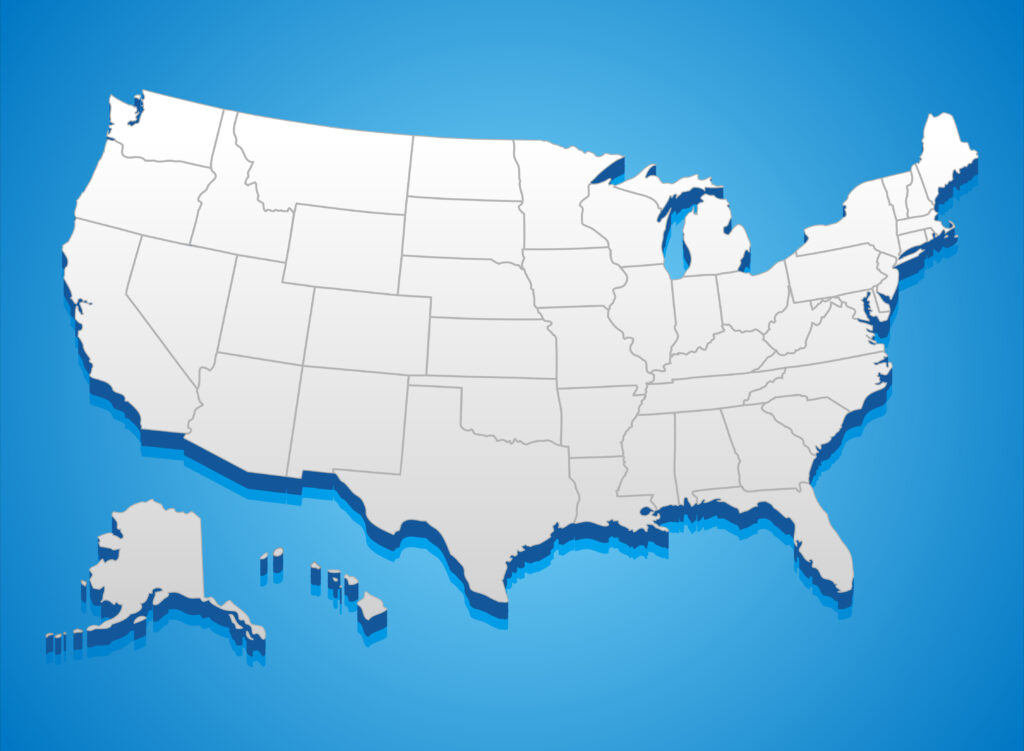Legislative and Litigation Overview of Five-Month Abortion Laws Enacted Before or After 2010
co-authored by Thomas M. Messner, J.D.
This is Issue 34 of the On Point Series. The most current version of this paper can be found at Legislative and Litigation Overview of 20-Week Abortion Laws.
This paper sets out legislative and litigation information involving state laws that prohibit abortion at 20 weeks of pregnancy, roughly five months or more than halfway through pregnancy.
Summary
Since January 2010, twenty-one states have enacted statutes prohibiting abortion at 20 weeks of pregnancy, roughly five months or more than halfway through pregnancy. All but one of these laws make at least some explicit reference to fetal pain in either the title, findings, statement of purpose or intent, definitions, substantive provisions, or some combination of these legislative elements. Evidence shows that unborn children can feel pain by 20 weeks of pregnancy.[1]
Of the 21 five-month laws enacted since 2010, only four have faced challenge in court and, to date, only two have been permanently enjoined. A challenge in Georgia state courts asserting only state law claims failed. A federal court lawsuit challenging the 20-week law in Missouri was filed on July 30, 2019 and continues in litigation.
Three additional states enacted five-month abortion bans well before 2010: Delaware in 1969, North Carolina in 1973, and Utah in 1991. None of these three laws is currently in effect and we have uncovered no evidence suggesting that any of these three laws related in any way to the issue of fetal pain.
Overview of Five-Month Laws Enacted Since 2010
This section provides a summary regarding 21 state laws that prohibit abortion at 20 weeks of pregnancy, roughly five months or more than halfway through pregnancy. Additional legislative research details for these 21 laws can be found in the appendix.
Since 2010, five-month abortion laws have been enacted by 21 states, which appear as follows by alphabetical order. The year given for each state represents the year of enactment not the year in which the law became effective, if different.
- Alabama (2011)
- Arizona (2012)
- Arkansas (2013)
- Georgia (2012)
- Idaho (2011)
- Indiana (2011)
- Iowa (2017)
- Kansas (2011)
- Kentucky (2017)
- Louisiana (2012)
- Mississippi (2014)
- Missouri (2019)
- Nebraska (2010)
- North Dakota (2013)
- Ohio (2016)
- Oklahoma (2011)
- South Carolina (2016)
- South Dakota (2016)
- Texas (2013)
- West Virginia (2015)
- Wisconsin (2015)
Somewhere in the United States a state legislature has enacted a five-month abortion law each year from 2010 to 2019 except for 2018, as set out below chronologically by year then alphabetically under each year.
- 2010
- Nebraska
- 2011
- Alabama
- Idaho
- Indiana
- Kansas
- Oklahoma
- 2012
- Arizona
- Georgia
- Louisiana
- 2013
- Arkansas
- North Dakota
- Texas
- 2014
- Mississippi
- 2015
- West Virginia
- Wisconsin
- 2016
- Ohio
- South Carolina
- South Dakota
- 2017
- Iowa
- Kentucky
- 2018
- 2019
- Missouri
Two of the 21 five-month abortions laws enacted since 2010 have been enacted over a gubernatorial veto: Arkansas and West Virginia.
Four of the 21 five-month abortion laws enacted since 2010 measure 20 weeks of pregnancy using the gestational or LMP method, which counts from the first day of the mother’s last menstrual period before conception. The remaining 17 laws measure the duration of pregnancy from the point of fertilization. The difference between the two methods can extend up to approximately two weeks with 20 weeks measured gestationally achieved up to two weeks earlier than 20 weeks measured from fertilization.
Of the 21 five-month laws enacted since 2010, only four have faced court challenge: Arizona, Idaho, Missouri, and Georgia. To date, only two of the challenged laws have been enjoined: Arizona and Idaho. Litigation continues in the Missouri case. The state-court challenge in Georgia failed. Short summaries of these four cases follow:
- Arizona. In Isaacson v. Horne, 716 F.3d 1213 (9th Cir. 2013), cert. denied Horne v. Isaacson, 571 U.S. 1127 (2014), the U.S. Court of Appeals for the Ninth Circuit enjoined the Arizona 20-week law on the grounds that the law violated the “viability rule” imposed by precedents of the U.S. Supreme Court. Under the viability rule, government may not prohibit abortion before the child reaches the age of viability, defined as the ability to survive outside the womb with support. In this case, the parties agreed that no child was viable at 20 weeks as measured by the statute.
- Idaho. In McCormack v. Herzog, 788 F.3d 1017 (9th Cir. 2015), the U.S. Court of Appeals for the Ninth Circuit enjoined the Idaho 20-week law on the grounds that the law violated the viability rule.
- Missouri. On July 30, 2019 abortion advocates filed a federal lawsuit challenging the Missouri Late-Term Pain-Capable Unborn Child Protection Act, enacted in 2019 as part of H.B. 126. The case is Reproductive Health Services of Planned Parenthood of the St. Louis Region, Inc. v. Parson, No. 2:19-cv-04155-HFS in the U.S. District Court for the Western District of Missouri (Jefferson City).
- Georgia. This case involved a state court challenge under the state constitution of Georgia and asserted no federal claims. A trial court eventually dismissed the case after having entered an interlocutory injunction to restrain enforcement of the law as to previability pregnancies. On appeal, in Lathrop v. Deal, 301 Ga. 408 (2017), the Supreme Court of Georgia ruled that the lawsuit was barred by the doctrine of sovereign immunity which “forbids [the courts in Georgia] to entertain a lawsuit against the State without its consent.”
The appendix provides additional legislative research detail for each of the 21 five-month abortion laws enacted since 2010.
Overview of Five-Month Abortion Laws Enacted Before 2010
At least three states enacted five-month abortion laws before 2010: Delaware in 1969, North Carolina in 1973, and Utah in 1991. None of these laws is currently in effect.
- Delaware enacted a 20-week law in 1969.[2]Delaware repealed its 20-week law in 2017.[3]
- North Carolina enacted a 20-week law in 1973.[4]A federal district court enjoined the North Carolina 20-week law on May 25, 2019.[5]The case is currently on appeal with the U.S. Court of Appeals for the Fourth Circuit.[6]
- Utah enacted a 20-week law in 1991.[7]The Utah law was enjoined by the U.S. Court of Appeals for the Tenth Circuit in 1996.[8]
We have uncovered no evidence suggesting that any of these three laws related in any way to the issue of fetal pain. Further, a 2015 amendment to the North Carolina law[9]makes no reference to the issue of fetal pain.
A seminal research paper on the topic of fetal pain was published in 1987.[10]To date we have uncovered no research suggesting this publication influenced enactment of the Utah 20-week law in 1991.
Thomas M. Messner, J.D. is Senior Fellow in Legal Policy and Amanda Stirone, J.D. is Associate Scholar at the Charlotte Lozier Institute. Updates to this publication made after the original date of publication by individuals other than the authors will be noted in future updates.
Appendix
This appendix provides legislative research details for the 21 states that have enacted five-month abortion laws since 2010.
Alabama
- State: Alabama
- Title: Alabama Pain-Capable Unborn Child Protection Act
- Date: June 15, 2011
- Veto Override: No
- Bill: Ala. H18 (2011)
- Statute: Ala. Act No. 2011-672
- Method of Measurement: Postfertilization age
- At Least One Legislative Finding re Pain: Yes
- Statement of Legislative Purpose or Intent re Pain: “It is the purpose of this state to assert a compelling state interest in protecting the lives of unborn children from the stage at which substantial medical evidence indicates that they are capable of feeling pain.”
- Status: In effect
- Online resources:
- Legislative information page: http://arc-sos.state.al.us/cgi/actdetail.mbr/detail?year=2011&act=%20672&page=bill
- Statute: http://arc-sos.state.al.us/PAC/SOSACPDF.001/A0008964.PDF
- Code: http://alisondb.legislature.state.al.us/alison/codeofalabama/1975/coatoc.htm(click on Title 26 then scroll to Chapter 23B)
Arizona
- State: Arizona
- Title: n/a
- Date: April 12, 2012
- Veto Override: no
- Bill: Ariz. H.B. 2036 (2012)
- Statute: Ariz. Sess. Laws Ch. 250 (2012)
- Method of Measurement: Gestational age
- At Least One Legislative Finding re Pain: Yes
- Statement of Legislative Purpose or Intent re Pain: “For these reasons, the legislature’s purposes in promulgating this act include to . . . Prohibit abortions at or after twenty weeks of gestation, except in cases of a medical emergency, based on the documented risks to women’s health and the strong medical evidence that unborn children feel pain during an abortion at that gestational age.”
- Status: Enjoined by Isaacson v. Horne, 716 F.3d 1213 (9th Cir. 2013), cert. denied Horne v. Isaacson, 571 U.S. 1127 (2014).
- Online resources:
- Statute: https://www.azleg.gov/legtext/50Leg/2R/laws/0250.pdf
- Code: https://www.azleg.gov/arsDetail/?title=36 (scroll to chapter 20 then click on Section 36-2159 under Article 1)
Arkansas
- State: Arkansas
- Title: Pain-Capable Unborn Child Protection Act
- Date: February 26, 2013
- Veto Override: Yes
- Bill: Ark. H.B. 1037 (2013)
- Statute: Pain-Capable Unborn Child Protection Act, No. 171, § 1 et seq. (2013)
- Method of Measurement: Postfertilization age
- At Least One Legislative Finding re Pain: Yes
- Statement of Legislative Purpose or Intent re Pain: “It is the purpose of the state to assert a compelling state interest in protecting the lives of unborn children from the stage at which substantial medical evidence indicates that they are capable of feeling pain . . . .”
- Status: In effect
- Online resources:
- Legislative information page: http://www.arkleg.state.ar.us/assembly/2013/2013R/Pages/BillInformation.aspx?measureno=HB1037
- Statute: http://www.arkleg.state.ar.us/assembly/2013/2013R/Acts/Act171.pdf
Georgia
- State: Georgia
- Title: n/a
- Date: May 1, 2012
- Veto Override: No
- Bill: Ga. H.B. 954 (2012)
- Statute: 2012 Ga. L. 631
- Method of Measurement: Postfertilization age (statute refers to “gestational age” but defines this term as “postfertilization age”)
- At Least One Legislative Finding re Pain: Yes
- Statement of Legislative Purpose or Intent re Pain: “It is the purpose of the State of Georgia to assert a compelling state interest in protecting the lives of unborn children from the stage at which substantial medical evidence indicates that they are capable of feeling pain.”
- Status: In effect
- Online resources:
- Legislative information page: http://www.legis.ga.gov/Legislation/en-US/display/20112012/HB/954
- Statute: http://www.legis.ga.gov/Legislation/20112012/127778.pdf
Idaho
- State: Idaho
- Title: Pain-Capable Unborn Child Protection Act
- Date: April 13, 2011
- Veto Override: No
- Bill: Idaho S.B. 1165 (2011)
- Statute: Pain-Capable Unborn Child Protection Act, Ch. 324, [2011] Idaho Session Laws 945.
- Method of Measurement: Postfertilization age
- At Least One Legislative Finding re Pain: Yes
- Statement of Legislative Purpose or Intent re Pain: “It is the purpose of the state of Idaho to assert a compelling state interest in protecting the lives of unborn children from the stage at which substantial medical evidence indicates that they are capable of feeling pain.”
- Status:Enjoined by McCormack v. Herzog, 788 F.3d 1017 (9th Cir. 2015).
- Online resources:
Indiana
- State: Indiana
- Title: n/a
- Date: May 10, 2011
- Veto Override: No
- Bill: Ind. H.E.A. 1210 (2011)
- Statute: P.L.193-2011, Sec. 6
- Method of Measurement: Postfertilization age
- At Least One Legislative Finding re Pain: Yes
- Statement of Legislative Purpose or Intent re Pain: “Indiana asserts a compelling state interest in protecting the life of a fetus from the state at which substantial medical evidence indicates that the fetus is capable of feeling pain.”
- Status: In effect
- Online resources:
- Bill: http://www.in.gov/legislative/bills/2011/HE/HE1210.1.html
- Statute: http://www.in.gov/legislative/pdf/acts_2011.pdf (on first page click on link for “193”)
- Findings: http://iga.in.gov/legislative/laws/2018/ic/titles/016#16-34 (scroll to IC 16-34-1-9)
Iowa
- State: Iowa
- Title: An Act Relating to Limitations on and Prerequisites for an Abortion, Providing for Licensee Discipline, Providing Civil Penalties, and Including Effective Date Provisions
- Date: May 5, 2017
- Veto Override: No
- Bill: Ia. S.F. 471 (2017)
- Statute: Iowa General Assembly: 87 (2017 Regular GA), Ch. 108
- Method of Measurement: Postfertilization age
- At Least One Legislative Finding re Pain: No
- Statement of Legislative Purpose or Intent re Pain:
- Status: In effect
- Online resources:
- Legislative information page: https://www.legis.iowa.gov/legislation/billTracking/billHistory?billName=SF%20471&ga=87
- Video of Rep. Lundgren opening comments on S.F. 471: https://www.legis.iowa.gov/dashboard?view=video&chamber=H&clip=H20170404184413754&dt=2017-04-04&offset=716&bill=SF%20471&status=r
- Statute: https://www.legis.iowa.gov/docs/publications/iactc/87.1/CH0108.pdf
- Note: A previous version of S.F. 471, referred to as S.F. 53, contained findings and a statement of legislative purpose regarding fetal pain that did not appear in the later version eventually enacted. One of the Floor Managers for S.F. 471 was Representative Shannon Lundgren from Dubuque County. In opening comments on S.F. 471 Rep. Lundgren stated, “But most importantly and the reason for this bill today is that there is a significant scientific proof that supports a baby can feel pain at five months post-fertilization and maybe even earlier.”
Kansas
- State: Kansas
- Title: Abortion regulation based on capacity of unborn child to feel pain
- Date: April 8, 2011
- Veto Override: No
- Bill: 2011 Kansas H.B. No. 2218
- Statute: Laws 2011, ch. 41, § 3, eff. July 1, 2011.
- Method of Measurement: Gestational age
- At Least One Legislative Finding re Pain: Yes
- Statement of Legislative Purpose or Intent re Pain: “[I]t is the purpose of the state to assert a compelling state interest in protecting the lives of unborn children from the stage at which substantial medical evidence indicates that they are capable of feeling pain.”
- Status: In effect
- Online resources:
- Statute: http://www.kssos.org/pubs/sessionlaws/2011%20Session%20Laws%20Volume%201.pdf (see page 590)
Kentucky
- State: Kentucky
- Title: n/a
- Date: January 9, 2017
- Veto Override: No
- Bill: KY S.B. 5 (2017)
- Statute: Abortion—PostFertilization Age—Affirmative Defenses, 2017 Kentucky Laws Ch. 5 (S.B. 5)
- Method of Measurement: Postfertilization age
- At Least One Legislative Finding re Pain: Yes
- Statement of Legislative Purpose or Intent re Pain: “[I]t is the purpose of the state to assert a compelling state interest in protecting the lives of unborn children from the stage at which substantial medical evidence indicates that they are capable of feeling pain . . . .”
- Status: In effect
- Online resources:
- Legislative information page: https://legiscan.com/KY/bill/SB5/2017
- Bill: https://legiscan.com/KY/text/SB5/id/1539922/Kentucky-2017-SB5-Draft.pdf
Louisiana
- State: Louisiana
- Title: Pain-Capable Unborn Child Protection Act
- Date: August 1, 2012
- Veto Override: No
- Bill: La. S.B. 766 (2012)
- Statute: Abortion, 2012 La. Sess. Law Serv. Act 738 (S.B. 766)
- Method of Measurement: Postfertilization age
- At Least One Legislative Finding re Pain: Yes
- Statement of Legislative Purpose or Intent re Pain: “It is the purpose of the state to assert a compelling state interest in protecting the lives of unborn children from the stage at which substantial medical evidence indicates that they are capable of feeling pain.”
- Status: In effect
- Online resources:
Mississippi
- State: Mississippi
- Title: The Women’s Health Protection and Preborn Pain Act
- Date: July 1, 2014
- Veto Override: No
- Bill:Miss. H.B. 1400 (2014)
- Statute: Miss. Laws, 2014, ch. 506, § 3
- Method of Measurement: Gestational age
- At Least One Legislative Finding re Pain: Yes
- Statement of Legislative Purpose or Intent re Pain: “The state has a compelling state interest in protecting the lives of unborn children from the stage at which substantial medical evidence indicates that these children are capable of feeling pain . . . .”
- Status: In effect
- Online resources:
Missouri
- State: Missouri
- Title: Late-Term Pain-Capable Unborn Child Protection Act
- Date: May 24, 2019
- Veto Override: No
- Bill: L.2019, H.B. No. 126, § A, eff. Aug. 28, 2019
- Statute: MO Stat.188.375
- Method of Measurement: Gestational age
- At Least One Legislative Finding re Pain: No (but see note below)
- Statement of Legislative Purpose or Intent re Pain:
- Status: In effect
- Online resources:
- Note: The Missouri Late-Term Pain-Capable Unborn Child Protection Act was created by House Bill No. 126 of the 100th General Assembly. A separate provision of the same act includes findings regarding fetal pain.
Nebraska
- State: Nebraska
- Title: Pain Capable Unborn Child Protection Act
- Date: April 13, 2010
- Veto Override: No
- Bill: Neb. L.B. 1103 (2010)
- Statute: Laws 2010, LB1103, § 1 et seq.
- Method of Measurement: Postfertilization age
- At Least One Legislative Finding re Pain: Yes
- Statement of Legislative Purpose or Intent re Pain: “It is the purpose of the State of Nebraska to assert a compelling state interest in protecting the lives of unborn children from the stage at which substantial medical evidence indicates that they are capable of feeling pain.”
- Status: In effect
- Online resources:
- Legislative information page: https://nebraskalegislature.gov/bills/view_bill.php?DocumentID=10024
- Bill: https://nebraskalegislature.gov/FloorDocs/101/PDF/Slip/LB1103.pdf
North Dakota
- State: North Dakota
- Title: n/a
- Date: August 1, 2013
- Veto Override: No
- Bill: N.D. S.B. 2368 (2013)
- Statute: S.L. 2013, ch. 116, § 3, eff. Aug. 1, 2013; S.L. 2013, ch. 35, § 8, eff. July 1, 2013.
- Method of Measurement: Postfertilization age
- At Least One Legislative Finding re Pain: No
- Statement of Legislative Purpose or Intent re Pain: “The purpose of this section is to protect the state’s compelling interest in the unborn human life from the time the unborn child is capable of feeling pain.”
- Status: In effect
- Online resources:
Ohio
- State: Ohio
- Title: n/a
- Date: December 13, 2016
- Veto Override: No
- Bill: Oh. S.B. 127 (2016)
- Statute: 2016 Ohio Laws File 130 (Sub. S.B. 127)
- Method of Measurement: Postfertilization age
- At Least One Legislative Finding re Pain: No
- Statement of Legislative Purpose or Intent re Pain:
- Status: In effect
- Online resources:
- Note: Ohio Senate Bill 127 as enacted defines the term “pain-capable unborn child” as “an unborn child of a probable post-fertilization age of twenty weeks or more” and uses the term “pain-capable unborn child” in at least two instances.
Oklahoma
- State: Oklahoma
- Title: The Pain-Capable Unborn Child Protection Act
- Date: November 1, 2011
- Veto Override: No
- Bill: Okla. H.B. 1888 (2011)
- Statute: 2011 Okla. Sess. Law Serv. Ch. 89 (H.B. 1888)
- Method of Measurement: Postfertilization age
- At Least One Legislative Finding re Pain: Yes
- Statement of Legislative Purpose or Intent re Pain: “It is the purpose of the State of Oklahoma to assert a compelling state interest in protecting the lives of unborn children from the stage at which substantial medical evidence indicates that they are capable of feeling pain . . . .”
- Status: In effect
- Online resources:
- Bill: https://legiscan.com/OK/drafts/HB1888/2011(click on link for “Enrolled”)
South Carolina
- State: South Carolina
- Title: South Carolina Pain-Capable Unborn Child Protection Act
- Date: May 25, 2016
- Veto Override: No
- Bill: H. 3114 (2016)
- Statute: 2016 Act No. 183 (H. 3114), Section 1, eff. May 25, 2016
- Method of Measurement: Postfertilization age
- At Least One Legislative Finding re Pain: Yes
- Statement of Legislative Purpose or Intent re Pain: “It is the purpose of the State to assert a compelling state interest in protecting the lives of unborn children from the stage at which substantial medical evidence indicates that they are capable of feeling pain.”
- Status: In effect
- Online resources:
- Bill: https://www.scstatehouse.gov/sess121_2015-2016/bills/3114.htm(scroll down for bill text)
- Code: https://www.scstatehouse.gov/code/t44c041.php(scroll to Article 5)
South Dakota
- State: South Dakota
- Title: n/a
- Date: March 11, 2016
- Veto Override: No
- Bill: S.D. S.B. 72 (2016)
- Statute: SD Stat. § 34-23A-69
- Method of Measurement: Postfertilization age
- At Least One Legislative Finding re Pain: Yes
- Statement of Legislative Purpose or Intent re Pain: “The state has a compelling state interest in protecting the lives of unborn children from the stage at which substantial medical evidence indicates that they are capable of feeling pain . . . .”
- Status: In effect
- Online resources:
Texas
- State: Texas
- Title: Preborn Pain Act
- Date: July 18, 2013
- Veto Override: No
- Bill: Tex. H.B. 2 (2013)
- Method of Measurement: Postfertilization age
- At Least One Legislative Finding re Pain: Yes
- Statement of Legislative Purpose or Intent re Pain: “[T]he state has a compelling state interest in protecting the lives of unborn children from the stage at which substantial medical evidence indicates that these children are capable of feeling pain . . . .”
- Status: In effect
- Online resources:
- Bill: https://legiscan.com/TX/text/HB2/id/872841/Texas-2013-HB2-Enrolled.html
- Code: http://www.statutes.legis.state.tx.us/Docs/HS/htm/HS.171.htm#00(scroll to Subchapter C)
West Virginia
- State: West Virginia
- Title: The Pain-Capable Unborn Child Protection Act
- Date: April 25, 2015
- Veto Override: Yes
- Bill: W.V. H.B. 2568 (2015)
- Method of Measurement: Postfertilization age
- At Least One Legislative Finding re Pain: Yes
- Statement of Legislative Purpose or Intent re Pain: “It is the purpose of the state to assert a compelling state interest in protecting the lives of unborn children from the stage at which substantial medical evidence indicates that they are capable of feeling pain.”
- Status: In effect
- Online resources:
Wisconsin
- State: Wisconsin
- Title: n/a
- Date: July 20, 2015
- Veto Override: No
- Bill: Wis. S.B. 179 (2015)
- Statute: 2015-2016 Wisc. Legis. Serv. Act 56 (2015 S.B. 179)
- Method of Measurement: Postfertilization age
- At Least One Legislative Finding re Pain: Yes
- Statement of Legislative Purpose or Intent re Pain: “It is the purpose of the state to assert a compelling state interest in protecting the lives of unborn children from the stage at which substantial medical evidence indicates that they are capable of feeling pain. In enacting this legislation, Wisconsin is not asking the Supreme Court to overturn or replace its holding, first articulated in Roe v. Wade and reaffirmed in Planned Parenthood of Southeastern Pennsylvania v. Casey, that the state interest in unborn human life, which is ‘legitimate’ throughout pregnancy, becomes ‘compelling’ at viability. Rather, it asserts a separate and independent compelling state interest in unborn human life that exists once the unborn child is capable of feeling pain. It is asserted not in replacement of, but in addition, to, the state interest in the viable unborn child.”
- Status: In effect
- Online resources:
- Legislative information page: https://docs.legis.wisconsin.gov/2015/proposals/sb179
- Bill: https://docs.legis.wisconsin.gov/2015/related/proposals/sb179-engrossed
[1]See Charlotte Lozier Inst., “Fact Sheet: Science of Fetal Pain,” last updated Dec. 17, 2018, https://lozierinstitute.org/fact-sheet-science-of-fetal-pain/.
[2]Del. Code Ann. tit. 24 § 1741 (1969) (available at https://delcode.delaware.gov/sessionlaws/ga125/chp145.shtml).
[3]Del. S.B. 5 (2017) (available at https://delcode.delaware.gov/sessionlaws/ga149/chp035.shtml).
[4]N.C. H.B. 615 (1973) (available at http://digital.ncdcr.gov/cdm/ref/collection/p249901coll22/id/357896(see pg. 1057-1058).
[5]Bryant v. Woodall, 363 F. Supp. 3d 611, 614 (M.D.N.C. 2019).
[6]Bryant v. Woodall, No. 19-1685 (4th Cir. 2019).
[7]U.C.A. 1953 § 76-7-301 et seq. (1991, amend. 2010).
[8]Jane L. v. Bangerter, 102 F.3d 1112 (10th Cir. 1996).
[9]N.C. H.B. 465 (2015) (available at https://www.ncleg.gov/Sessions/2015/Bills/House/PDF/H465v6.pdf).
[10]Anand KJS and Hickey PR, Pain and Its Effects in the Human Neonate and Fetus, 317 N. Engl. J. Med.1321 (1987).



























